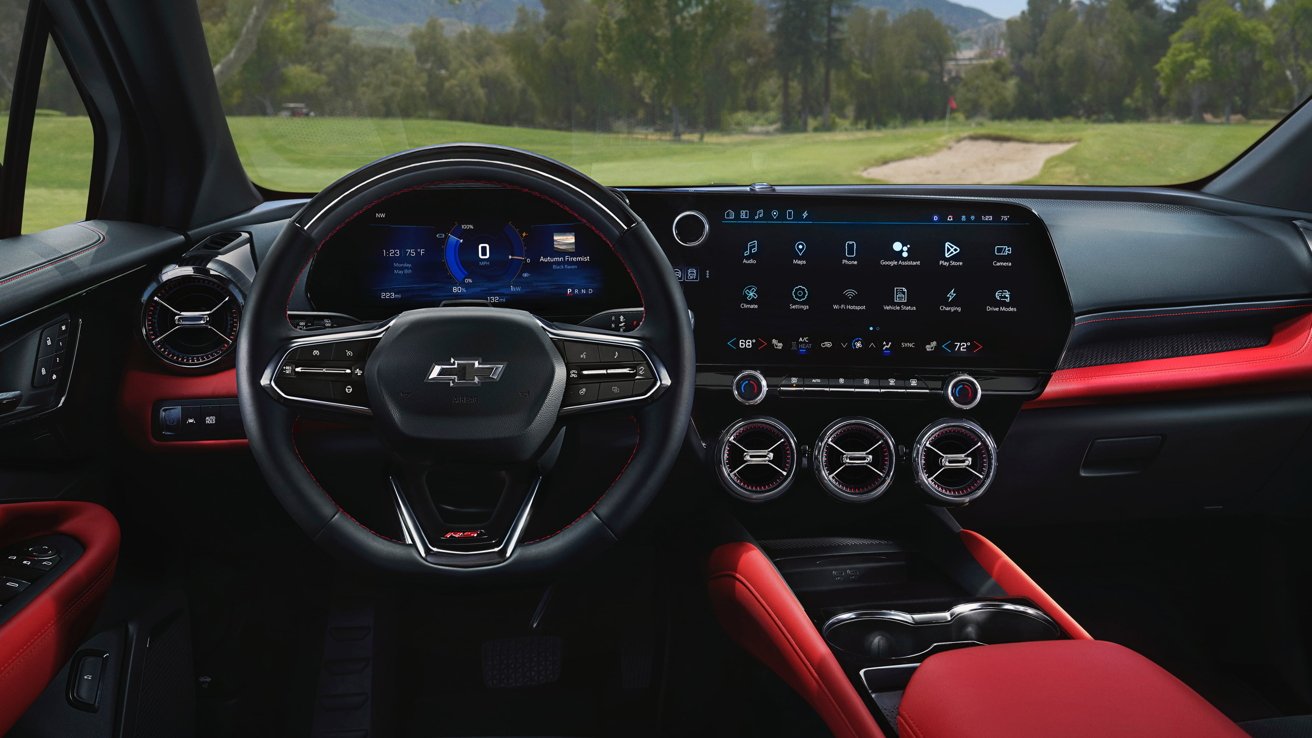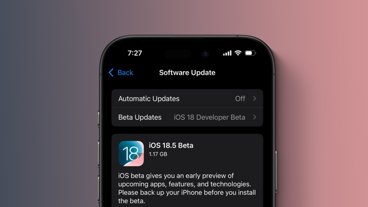GM's decision to move away from CarPlay was to avoid Apple having too much control over vehicles. It's going to be a bumpy ride for consumers.
In March 2023, GM decided to stop providing CarPlay and Android Auto to consumers, in favor of using its own system. With CarPlay increasing its hooks into the systems of vehicles, it was too much for GM to stomach.
GM's response was to make its own interface, starting with the 2024 Chevrolet Blazer. At first glance, it seems the effort has teething issues.
In one example recounted by Bloomberg, customer Michael Waldron picked up his SUV in November. It used GM's Ultifi platform, an infotainment system that did away with CarPlay in favor of GM's own vision.
There was a problem, in that in cutting off Apple's access to in-car systems, GM's interface had the opposite problem. While CarPlay offered access to many services and apps on a connected iPhone, Ultifi couldn't offer the same level of information.
This included limiting how users could access new messages over Bluetooth. Waldron couldn't ask Siri for directions to a location, forcing him instead to go via Google Maps.
A lack of Apple Music and Podcast apps also irked the family. While Ultifi had all of the key elements in place as an in-car interface, it lacked access to the iPhone.
The Waldron family also discovered major stability problems, with app crashes before the system bricked itself. Settings couldn't be changed for the 600-mile Thanksgiving journey, leaving them stuck on Sirius XM's 1990's radio channel.
Like others, the family were soon without their vehicle for a month as the dealership worked to fix the issues.
GM halted sales of the car from December until it could fix the issues.
A problematic solution
The entire situation was an attempt by GM to create its own software team to make a better dashboard experience than CarPlay. One that it could control directly, and potentially capitalize on instead of relying on Apple's software.
Apple was a threat to become "the iOS of the vehicle," said GM SVP of strategy and innovation Alan Wexler. "It's a physical vehicle, but it's an iPhone you're driving."
GM was fine with CarPlay offering entertainment, but balked at Apple's intention to control more of a vehicle's functions. Achieving that would mean Apple had more control over how GM could earn digital revenue from its customers.
In Ultifi's construction, GM nmade a system to have more control over the vehicle. An interface that provided speed and mileage data, handled the EV's battery life, and even internal lighting.
"The minute you decide to Balkanize and outsource those pieces, you cannot create those kinds of experiences," GM software and services group head Baris Cetinok offered. Cetinok previously work on iCloud and Wallet for Apple.
To GM, the software is a potential big earner for the company. It reckons that digital services could produce up to $25 billion in revenue per year by 2030, which it would prefer to have than hand over to Apple.
Following the preview of CarPlay's future by Apple, car companies were pressed into action, with GM hiring employees away from tech giants to produce its own system.
However it was not prepared for the initial teething issues it faced, both from customers and from trade reviews.
After stopping sales of the Blazer, GM executives spent weeks working to diagnose the issues and fix them.
Part of the issue was GM's need to have five different groups managing different areas of the vehicle's technology. That has since changed to a centralized review system to prevent issues.
Even after creating fixes, they weren't distributed until March. Consumers also said that updates involved dealership workers downloading the software to thumb drives, in processes taking up to eight hours.
By contrast, Apple's CarPlay updates are relatively rapid, included as part of iOS updates.
A tough sell
Despite the issues, the $25 billion carrot is still attractive enough for GM to continue.
Chevy product marketing director Darin Gesse explained that Ultifi will be difficult to sell to "hardcore Apple users," but component-integrated features will win out in the end.
Part of the problem Geese refers to is the sheer popularity of CarPlay.
In 2022, Apple said 79% of US car buyers would only consider buying cars that were compatible with CarPlay. Rivian also performed similar research at around the same time, finding that 70% of its customers wanted CarPlay access.
Rivian worked to make its interface more useful, such as giving letter grades to EV charging stations. The initiative worked to reduce the figure, with only 30% of its customers now wanting CarPlay.
GM seemingly hopes to break customer dependency on CarPlay in the same way. All by making the software more useful to the driver by integrating it more deeply.
In GM's vision, that means things like mapping systems tapping other data points of the vehicle. While a driver may ask for directions, they will also get predictions of battery capacity and a route that passes by charging stations.
This would be useful for drivers, along with other features that could aid the driving experience beyond what CarPlay is capable of doing. But GM still has a long way to go before it can break the CarPlay dependency completely.
 Malcolm Owen
Malcolm Owen







-m.jpg)






 Wesley Hilliard
Wesley Hilliard
 Marko Zivkovic
Marko Zivkovic

 Christine McKee
Christine McKee
 Amber Neely
Amber Neely










46 Comments
GM is not the only one. Mercedes Benz officially confirmed that CarPlay will not be supported for next models.
The reason of Mercedes is that Apple wants to strive for "All or Nothign" strategy.
Mercedes Benz would have no issue to have CarPlay as long as basic features can be played by Apple, but Mercedes Benz is not willing to give up the entire control to Apple.
I fear that more and more OEMs would follow GM´s and MB´s decision not to support Apple CarPlay if Apple continues sticking to their "All or Nothing" strategy.
But Having driven EQS, I have to say that MB is way way behind in the UI/UX area.
MB tries hard to present their cars as a modern technology, but it feels old somehow.
Nothing can top the simplified UI/UX made by Apple.
“In favour of its own system”? Its own system from China?
To a degree I feel sorry for them they have decided to pigeon hole themselves into something that has no chance of working. Check with Toyota and other late adopters how well that went for them. Additionally people know the interface as it is in nearly every car made. It is as if they want to sell fewer cars.
"
An absolutely perfect and understandable stance to have, especially if they want to monetise certain areas of the software side.
Bring your phone by all means but the car is the car and is a product of the manufacturer. The phone system shouldn't act as a monetary vampire as soon as you plug it in.
I can see why OEMs are reluctant here. Unless that is they have a collaborative agreement where everything is laid out and represents a win/win for both parties.
There will always be teething problems but I thought that was where Google was supposed to be jumping onboard for future efforts.